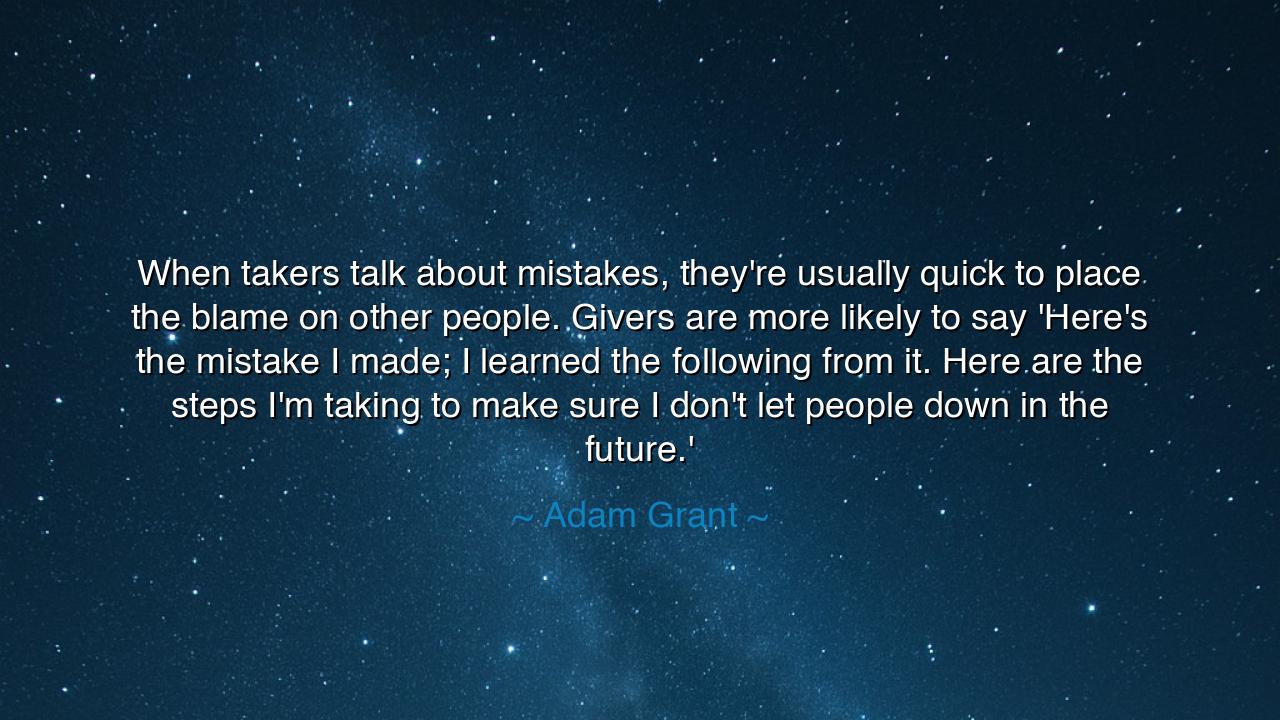
When takers talk about mistakes, they're usually quick to place
When takers talk about mistakes, they're usually quick to place the blame on other people. Givers are more likely to say 'Here's the mistake I made; I learned the following from it. Here are the steps I'm taking to make sure I don't let people down in the future.'






The scholar and thinker Adam Grant, a modern sage in the study of character and purpose, once wrote: “When takers talk about mistakes, they're usually quick to place the blame on other people. Givers are more likely to say, ‘Here's the mistake I made; I learned the following from it. Here are the steps I'm taking to make sure I don't let people down in the future.’” These words, though spoken in the language of modern work and psychology, carry an ancient moral truth — that the measure of a person is not in how they succeed, but in how they answer their own failure. For in the heart of every mistake lies the seed of either growth or decay, and the way one tends to that seed determines the nature of their soul.
In the manner of the ancients, let us first understand who the takers and givers are. The taker is one who moves through life as if it were a market made for his pleasure — seeking always to gain advantage, to draw from others what he can use, and to cast aside what no longer serves him. When such a one stumbles or errs, he cannot face his own reflection. To admit fault would wound his pride, so he turns outward, pointing the finger toward others — subordinates, circumstances, even fate itself. The giver, by contrast, lives not for advantage but for responsibility. He understands that his mistakes, though painful, are his teachers. To the giver, fault is not a shame to hide, but a lesson to be learned, a fire through which the heart is refined.
The origin of Grant’s words arises from his work on the balance between self-interest and generosity — the study of how some rise by lifting others, while others fall by stepping upon them. Through his research, he observed a universal truth: that those who blame others may find temporary comfort, but they never find wisdom. Meanwhile, those who take ownership of their errors grow stronger, wiser, and more trusted by those around them. The giver’s strength lies in humility — not the false humility that grovels, but the noble kind that accepts imperfection as the price of humanity. In admitting fault, they forge connection; in learning from it, they forge progress.
Consider the story of Abraham Lincoln, the humble president who bore the weight of a fractured nation. When his generals failed in battle or his plans went awry, he did not lash out nor seek scapegoats. Instead, he took the blame upon himself, even when others were at fault. “I am responsible,” he would say, “for the errors of my subordinates.” This humility did not weaken him — it strengthened his leadership. His willingness to bear fault inspired loyalty, compassion, and unity in those around him. It was this spirit of the giver, not the taker, that made Lincoln one of the most revered leaders in history. Through his example, we see that true greatness is not in never erring, but in owning one’s errors and transforming them into wisdom.
In Grant’s teaching, we find a mirror for our own age — an age where blame travels faster than truth, and humility is mistaken for weakness. To say, “Here’s the mistake I made,” is to perform an act of courage. It is to stand naked before the world, unshielded by excuses, and yet unashamed. The giver’s heart knows that to err is human, but to grow from error is divine. The taker, however, remains trapped in the illusion of perfection, blind to his own faults and deaf to the lessons they whisper. In protecting his ego, he loses his soul.
O seekers of wisdom, learn from this sacred distinction: blame is a shield for the coward; responsibility is a crown for the wise. When you err — and all mortals do — resist the urge to point outward. Turn instead inward, and ask: What can I learn? How can I make amends? How can I serve better next time? This practice, though humble, is the root of mastery. The great sculptor shapes his art not by denying the flaws in the stone, but by working through them with patient care. So too must you shape your character — not by hiding your mistakes, but by refining them into strength.
And so, let the lesson of Adam Grant’s words be etched into your heart: the giver transforms error into excellence, while the taker transforms it into bitterness. Choose, then, to be a giver. When you fail, own it fully. When you succeed, share the credit freely. Speak truth about your mistakes, not to punish yourself, but to free yourself from pride. In doing so, you will earn the respect of others and the peace of your own conscience. For in the end, the world remembers not those who blamed, but those who learned, grew, and gave — those who made their failures a stepping stone to wisdom, and their humility a light for all who follow.






AAdministratorAdministrator
Welcome, honored guests. Please leave a comment, we will respond soon